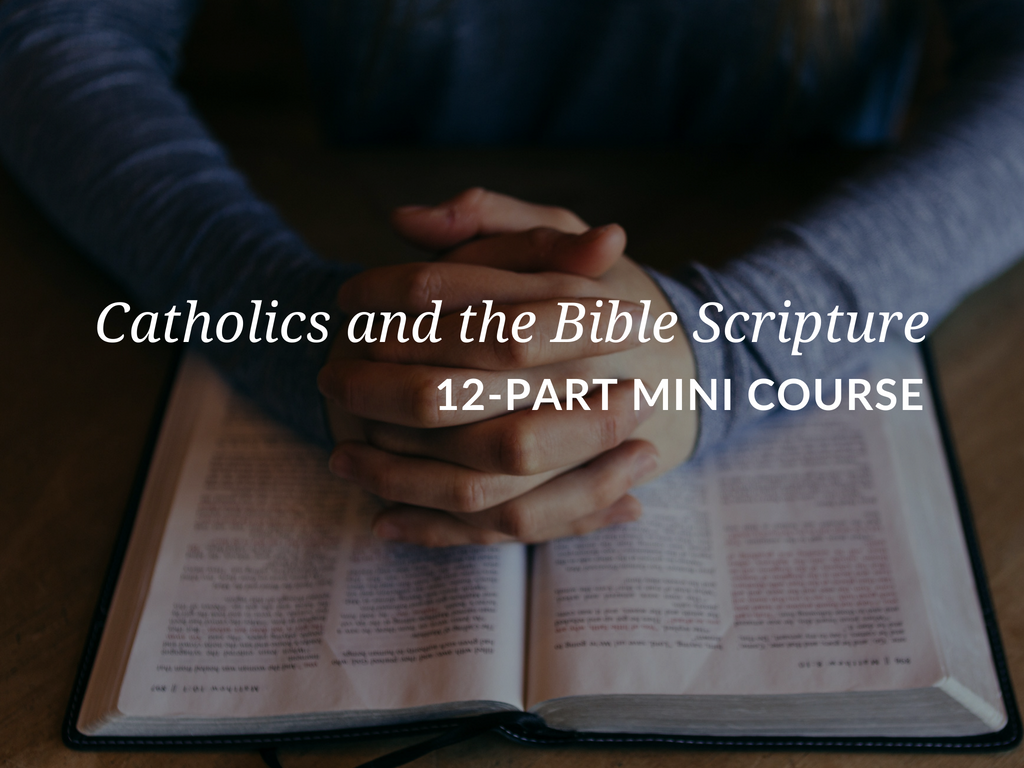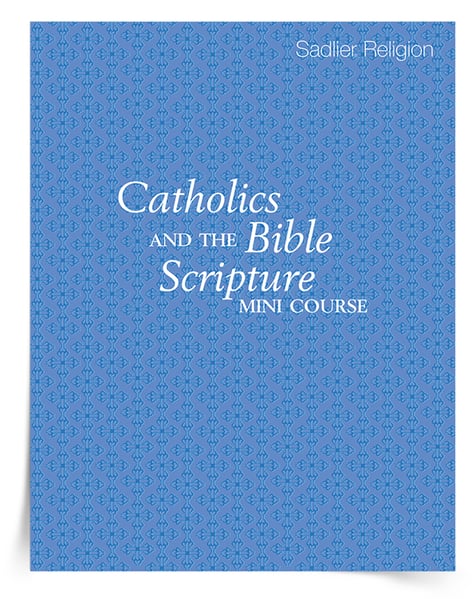June 14, 2018 WBB For Catechists, WBB Scripture, REL Asset - Activity, REL PD - Adult Faith, REL Catechetical - Adult, REL PD - Catechist, REL Topic - Scripture
Catholics and the Bible – Free Scripture Course for Adults & Catechist Development
By: Allie Johnston
During the slower paced summer months, consider participating in a Scripture mini course entitled Catholics and the Bible. This twelve-part series of articles with embedded questions for reflection and discussion are combined into a printable course-pack. Download available in English and Spanish! The mini course can be a self-guided endeavor or adapted to become a small group Scripture mini course for adults. This series is appropriate for catechist development, for adult faith formation, or for adults just looking to expand their knowledge of the Bible and reflect spiritually during the summer months.
Catholics and the Bible Scripture Mini Course
At its heart, the Catholics and the Bible Scripture Mini Course examines various aspects of how best to read and interpret the Bible from a Catholic perspective. But each of the twelve articles takes a particular focus for the reader and includes suggestions for implementation by the individual at home in his or her own life. The series begins with a bit of history; the first article starts with the historic Synod in Rome on "The Scriptures in the Life and Mission of the Church." The following articles track the Church's embrace of the modern biblical renewal and consider some of the principles for a sound interpretation of the Bible by a community of faith.
To kick-off your Catholics and the Bible Scripture Mini Course, download the course-pack and let this blog post guide you through the included articles and opportunities for reflection. Consider participating in this mini course over twelve days, twelve weeks, or whatever span of time that best fits your schedule!
Part 1: Embracing the Modern Biblical Renewal
Begin with article 1, entitled “Embracing the Modern Biblical Renewal: First in a Series on Catholics and the Bible.” It will bring you up to speed on modern biblical methods and invite you to examine your own understandings of the Bible and consider the particular convictions or assumptions you bring to your reading and study of the Bible.
Part 2: Church Leadership Paves the Way
In article two, explore the history leading up to the Church endorsing modern Biblical methods. “Church Leadership Paves the Way: Second in a Series on Catholics and the Bible” explains that the Church firmly believes that there is no inherent contradiction between exploring the human dimensions of the biblical text and its history and viewing the Bible from the vantage point of Christian faith. This article will ask you to consider ways that the Bible and its content have become familiar to you as a Catholic and what difference this has made in your faith.
Part 3: God’s Word in Human Hands
The third article, “God’s Word in Human Hands: Third in a Series on Catholics and the Bible” considers specific principles that guide a Catholic interpretation of the Bible, essential for a solid Catholic interpretation of Scripture. After reading the article, ponder what it means to say “God is the author of the Bible.”
Part 4: The Bible Has Many Meanings
The stories and sayings of the Bible are rich in potential meaning and have many dimensions that reveal themselves to the attentive reader. The fourth article, “The Bible Has Many Meaning: Fourth in a Series on Catholics and the Bible,” discusses finding multiple authentic meanings in biblical passages and introduces the safeguard against bizarre or harmful interpretations. This article will inform and then challenge you to take a favorite biblical story and see how many different meanings you (and your friends or other participants) might find in this story.
Part 5: The Bible in Community
The fifth article, “The Bible in Community: Fifth in a Series on Catholics and the Bible” explores ways that The Bible - because of its nature as a "communal" text that emerged from the Church and belongs to the Church - is not the preserve of any single individual but should ultimately be understood in the context of the community of faith as a whole. You’ll consider why is it important to ultimately understand the teaching of the Bible in the context of the Christian community as a whole.
Part 6: Scripture and Tradition
The one Word of God is communicated both in Scripture and in Tradition. Catholic teaching affirms that the Word of God communicated in the Scriptures is also fundamentally revealed through the sacred Tradition of the Church. In article six, “Scripture and Tradition: Sixth in a Series on Catholics and the Bible” explore ways that these two expressions of God’s Word to us are inseparably bound to each other and affirm each other. You’ll consider what the phrase “Sacred Tradition” means to Catholics.
Part 7: Reading the Bible as a Whole
To draw out what a biblical passage might mean for life as a person of faith or to understand the value of the Bible on a particular moral issue, one must interpret the meaning of any particular passage of the Bible in the light of the whole of the Scriptures. Explore ways that the canon of Scripture came to be and what it means for thoughtful interpretation of the Bible. After reading, you’ll be challenged to think of a specific biblical passage or story that needs a wider context in order for it to be properly understood.
Part 8: Reading the Bible in the Light of Christ
The eighth article, entitled “Reading the Bible in the Light of Christ: Eighth in a Series on Catholics and the Bible,” reminds the reader that we read the Scripture as Christians, that is, from the vantage point of faith in Jesus Christ. The article explores what this means as we read the Old and New Testaments. After reading this article, you’ll reflect on what it mean for us as Christians to read the Old Testament Scriptures "retrospectively," from the vantage point of our faith in Jesus.
Part 9: The Bible Made “Actual” by an “Attentive” Community
As Catholics we believe that God’s Word speaks to us today and we want to draw from the Scriptures a message that can transform our lives. In The Interpretation of the Bible in the Church study published by the Pontifical Biblical Commission in 1993, the text uses the word actualize to describe the process of finding what the Bible means for our lives today. Implicit in this principle of "actualizing" the biblical message is the need to be "attentive" to the Word of God that comes to us through the Scriptures. After reading this article, you’ll be asked to give some examples of how the message of the Bible is spiritually nourishing for you.
Part 10: Reading the Bible from Diverse Vantage Points
The tenth article, “Reading the Bible from Diverse Vantage Points: Tenth in a Series on Catholics and the Bible,” explores ways that each reader and group of readers brings the richness of their own experience and cultural background to the interpretation of God’s Word to us. This shows the need of a community of interpretation and not just our own individual insights. After reading, you’ll be asked to consider what mean to say that we can view the biblical text as a "window" or as a "mirror."
Part 11: Reading and Praying the Scriptures
The Church encourages Catholics to turn directly to the Scriptures and to reflect on them as a source of prayer and devotion. There are many ways and formats of reflecting on the Scriptures. Explore some ways in this eleventh article, “Reading and Praying the Scriptures: Eleventh on a Series on Catholics and the Bible.” After reading this article, you’ll consider one of these ways, Lectio Divina, in particular.
Part 12: Resources for Studying and Interpreting the Bible
To close the mini course, the last article in the series, entitled “Resources for Studying and Interpreting the Bible: Twelfth in a Series on Catholics and the Bible” lists helpful resources to help the reader continue to read the Bible in a thoughtful way. The article includes translations, commentaries, concordances, and programs for you to explore, and invites you to consider the difference it might make to you and your life as a Christian to study the Scriptures in a more in-depth way.
In Conclusion
Download the Catholics and the Bible Scripture Mini Course to complement prayerful and thoughtful reading of the Bible.






